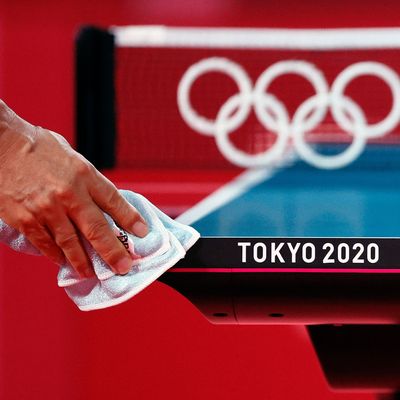
As detractors warned, the pandemic is roiling the Olympic Games in Tokyo before they are slated to begin at the end of the week. Tokyo is in a state of emergency and recording its highest daily numbers of new COVID-19 infections in six months. Though spectators have been barred from the rescheduled 2020 Summer Games, many in Japan have opposed the country’s decision to proceed with the Olympics, as have public-health experts across the globe.
A day before the Games were set to officially kick off Friday, Japanese organizers dismissed the show’s director — Kentaro Kobayashi — after decades-old remarks in which the comedian made light of the Holocaust resurfaced. “Looking back, I was not able to bring the smiles to the people, so that’s why I was not really thinking deep,” he said in a statement after his ouster, according to the Washington Post. “But I was actually making fun of the historical facts, and after that I regretted it.”
The firing was the latest in a string of bad news for the pandemic-delayed games; on Wednesday, the African nation of Guinea, which was set to send five athletes to Tokyo, announced it won’t be participating in the Olympics “due to the resurgence of COVID variants.”
While addressing the International Olympic Committee, World Health Organization Director Tedros Adhanom Ghebreyesus admitted there will be COVID cases at the games. “The mark of success is making sure that any cases are identified, isolated, traced and cared for as quickly as possible and onward transmission is interrupted,” he said Wednesday. The WHO chief stressed the importance of vaccinations, predicting another 100,000 people will die of COVID before the Olympic flame goes out on Aug. 8. A day earlier, the head of the Olympics organizing committee did not rule out the possibility of canceling the event altogether. “We can’t predict what will happen with the number of coronavirus cases,” Toshiro Muto said. So we will continue discussions if there is a spike in cases.”
On Monday, the country’s largest automaker, Toyota, announced that it will not run any television ads in Japan related to the Olympics and that company executives will not attend this week’s opening ceremony — a clear attempt to distance itself from the increasingly controversial event.
The same day, news broke that an alternate on the U.S. women’s gymnastics team had tested positive for COVID-19 just four days before the Games are set to begin. On Monday, U.S. officials said the gymnast tested positive on Sunday while training in Narita, which is about 35 miles east of Tokyo. The gymnast and another alternate on the team are now quarantining, NBC News reports. “Out of respect for the individual’s privacy, we cannot provide more information at this time,” the U.S. Olympic and Paralympic Committee said in a statement. NPR reports that it is unclear how much contact they had with the team’s six primary members.
The gymnast is the first member of Team USA known to have tested positive after arriving in Japan, but there have been at least a dozen new cases linked to the Games since Sunday. Two athletes and at least one other person inside Toyko’s closed-off athletes’ village tested positive this weekend. It’s not clear if the cases are the result of the virus spreading inside the Olympic Village, but the news underlines fears that many athletes will have their Olympic dreams derailed by COVID infections and precautions during the mid-pandemic Games.
All told, 25 new COVID cases were detected among athletes and other people associated with the Games over the weekend, according to Olympics organizers, but two South African soccer players, the country’s Olympic Committee confirmed Sunday, were the first two athletes inside the Olympic Village to test positive for the coronavirus. Olympics officials said that another athlete had tested positive Sunday, but outside the Olympic Village. On Saturday, officials announced the first case inside the isolated area, an Olympics organizer visiting from abroad. The Olympic Village, which is located on Tokyo Bay, will house some 11,000 people for the duration of the Games.
American tennis player Coco Gauff announced Sunday that she had tested positive for COVID and would not be able to play in the Games.
Two other members of South Africa’s Olympics contingent have also tested positive in Japan: a video analyst for the soccer team, who tested positive upon arrival in Tokyo, and the country’s head rugby-sevens coach, who is with that team training in another city in the country. All who test positive for COVID at the Olympics must go into isolation for 14 days. Contact tracing is being implemented, as well as are a host of safety measures and restrictions. The rest of South Africa’s soccer team quarantined Sunday while awaiting results of additional tests. Sunday also brought news that eight members of Team Great Britain in Yokohama, including six athletes, had been ordered to self-isolate because they had been in close contact with someone who tested positive on Friday. They will all need to test negative twice over 48 hours before being allowed to leave isolation and rejoin their teams. South Africa’s soccer team is scheduled to play Japan on Thursday. Also on Thursday: 11 new cases were reported, including four in the Olympic village. Two of those are athletes. On Friday, 19 more cases were reported, including two athletes.
IOC officials have insisted they will create a COVID-safe (not COVID-free) Games. Embattled IOC president Thomas Bach claimed last week that the Summer Olympics would be “the most restrictive sports event ever in the world” and that “the risk for the other residents of the Olympic Village and risk for the Japanese people is zero.”
As of Sunday, at least 55 people associated with the Olympics have tested positive this month, according to the International Olympic Committee, but that doesn’t include people at training camps. Reuters is tracking all the known cases here.
This post has been updated.





























